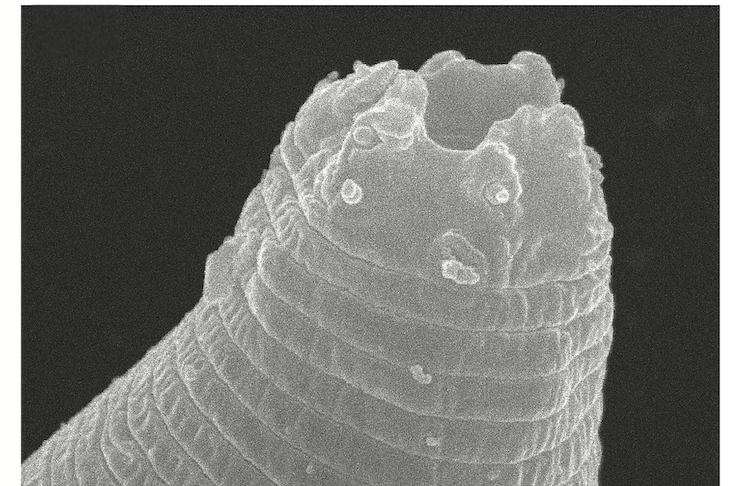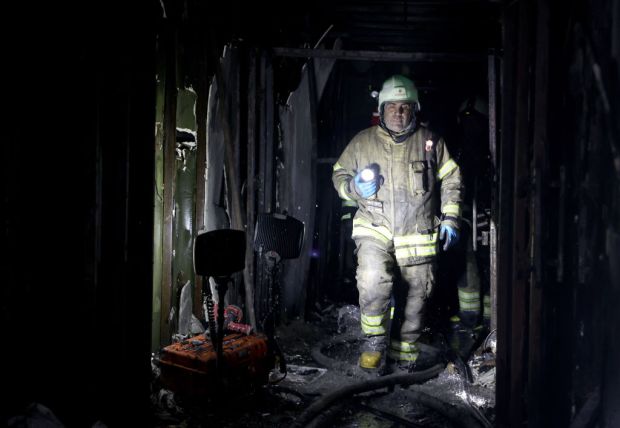The poet Elizabeth Bishop, when she was feeling blue (which she often was), used to find comfort in thinking in geological rather than human time. If the vast aeons amid which we wink in and out of existence render our lives insignificant, so too do they render our suffering. As someone else said: nothing matters very much, and few things matter at all.
These little worms, I think, can give us a welcome sense of perspective. A worm’s-eye view, if you will
I’m sure these thoughts, or something very like them, will have been the first to have gone through the small brains of the nematode worms which woke up the other day having been asleep for 46,000 years. Along with ‘what now?’ and ‘can you people for Chrissakes keep it down?’ and ‘what about a cup of tea?’ These worms, more even than the question of Nigel Farage’s bank account, were the star of this week’s news cycle: above all, because they really couldn’t give a hoot about the news cycle itself.
Did you miss it? Scientists, basically, discovered a pair of these worms deep-frozen at the bottom of a long-forgotten gopher burrow 130 feet below the Siberian permafrost. These worms, they established, had nodded off some time in the Pleistocene, when mammoths and Neanderthals were still kicking about the place and parking fines had yet to be invented. And after very much more than 20 centuries of stony sleep, the scientists plopped them in some warm water and they woke abruptly up like Golden Age Captain America in roundworm form. What a trip!
The worms lost no time in making the most of their time-travelling experience and started to reproduce. Asexually, that is (well, not all of us are perky first thing in the morning): they knocked out a whole brood of little wrigglers through parthenogenesis, and then (having lived many millions of times their natural waking lifespan of a few days) went to their well-earned rest. Their descendents are wriggling on to this day: a whole species, apparently, saved from extinction by a good long nap.
These little worms, I think, can give us a welcome sense of perspective. A worm’s-eye view, if you will. What, to a nematode worm that has been asleep since the Pleistocene, are the results of the Uxbridge by-election? Would this nematode, relatively unsophisticated though its brain may be, not look with wonder (should the matter be patiently explained to it) on the two main political parties of this country proposing to rethink their entire environmental policies in fright at the result of a West London vote? Would this worm, indeed, not look with a curled lip at the former Home Secretary, Priti Patel, calling for the government to shelve its net zero commitments altogether in the wake of the vote?
Leave aside that Ulez isn’t anything to do with global warming, net zero or the environment as a whole: it’s about trying to reduce the number of asthmatic kids and elderly people being poisoned by vehicle emissions in London. In the vague way of these things, it’s nevertheless associated in many people’s minds with green wokery, so that’s roughly the basket it falls into politically. And is there a starker instance of the perverse incentives that bedevil this government – any government – attempting to hedge against long-term environmental damage of one sort or another?
Electoral cycles are few years long; they are at the mercy of news cycles a few hours long; and the long-term future of the planet, which is to say, all of us, is at the mercy of climatic changes that used to be measured in centuries and are now measured, God help us, in decades. We’re just woefully ill-equipped to deal with this sort of thing by institutions set up to respond to whatever gets people re-elected a couple of years from now, and to hang the long term. This isn’t a party-political point, incidentally: Tony Blair was very keen on buying shiny new hospitals on tick with PFI, knowing he’d be long out of office before those really started to bite the public finances.
But it’s very much a point that our nematode friend, with their (seems the right pronoun, what with the parthenogenesis and all) long view, invites us to consider. Unless you believe that all this funny weather is a coincidence, and that the scientific consensus on global warming is some sort of hoax cooked up by woke globalists intent on the Great Reset, and are (for that matter) unconcerned that the very permafrost in which we met our vermicular buddy is itself melting like billy-oh… well, you’ll tend to want this government, or any government, to do something to stop it. Borrowing from our grandchildren is one thing; letting them boil is rather worse. And it’s worrying that our politicians, on the whole, recognise this but seem powerless – operating as they do in mayfly cycles of electoral advantage – to actually do anything very concrete about it.
There’s always an excuse, and the excuse is always that it’s not quite the right time: not just yet. The economy’s tricky right now; there’s a segment of voters in a sticky key marginal who’ll get clobbered – and the clobbering that they will get, because they are alive and well and speaking to the gatherers of opinion polls, weighs heavier on the mind than the rather greater clobberings that their descendents are going to get if nothing is done. We’ll definitely, actually, do something about it just as soon as the time is right. But then, blow me, here comes another by-election and we’ve read the runes, and, well, sorry.
The best time to stop emitting carbon, to adapt the old saying, is 50 years ago, and the best time is now. And of course we can argue about when and how, and the fairest way to manage it, and the best way to replace it, and whether electric cars are a boondoggle and carbon credits a scam. But the overall direction of travel is clear, and it needs to be determined by people prepared to think in geological time rather than news-cycle time. Just ask the worms.
Got something to add? Join the discussion and comment below.
Get 10 issues for just $10
Subscribe to The Spectator Australia today for the next 10 magazine issues, plus full online access, for just $10.





















Comments
Don't miss out
Join the conversation with other Spectator Australia readers. Subscribe to leave a comment.
SUBSCRIBEAlready a subscriber? Log in